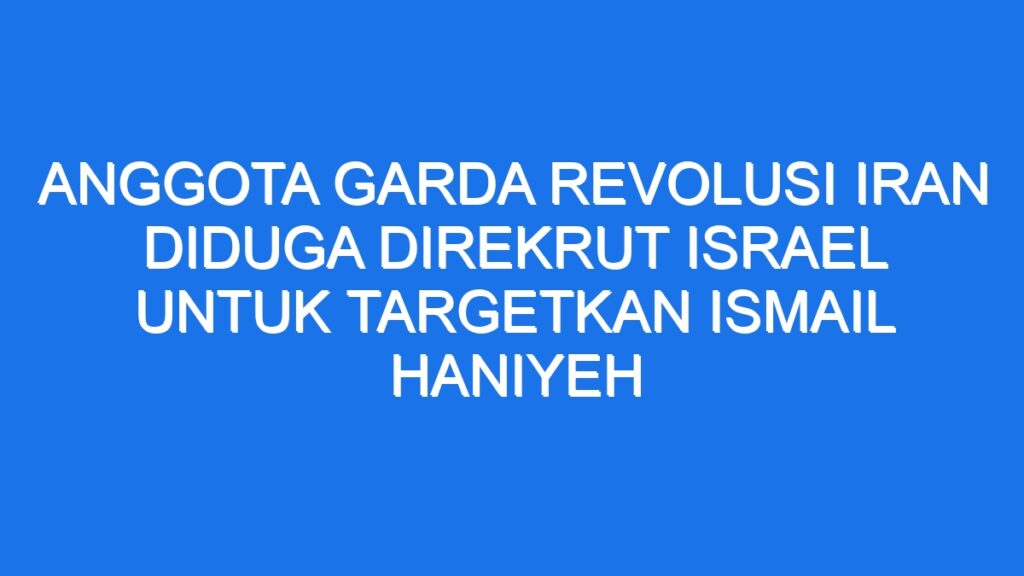Current Events and Tensions: Israel Iran News

The Israel-Iran conflict is a complex and volatile issue, marked by a history of animosity and mistrust. Recent events have intensified tensions, raising concerns about a potential escalation. This section delves into the current state of affairs, exploring recent military actions, political statements, and diplomatic efforts, as well as the influence of regional developments and international actors.
Recent Military Actions and Political Statements
Recent military actions and political statements have heightened tensions between Israel and Iran. In January 2023, Israel launched airstrikes against Iranian-backed targets in Syria, following reports of an Iranian drone attack on Israeli territory. Iran has condemned the strikes, vowing retaliation. The exchange of attacks has raised concerns about a potential escalation of the conflict.
Nuclear Program and Regional Security

The nuclear program of Iran and its implications for regional security are a complex and sensitive issue, attracting global attention and sparking significant concerns. This section delves into the intricate details of Iran’s nuclear ambitions, examining its progress, challenges, and the potential consequences for the Middle East.
Iran’s Nuclear Program: Progress and Challenges
Iran’s nuclear program has been a subject of international scrutiny and controversy for decades. The country maintains that its nuclear activities are solely for peaceful purposes, primarily for electricity generation and medical research. However, concerns persist about Iran’s potential to develop nuclear weapons, fueled by its past efforts to enrich uranium and its reluctance to fully cooperate with international inspectors.
- Enrichment Activities: Iran has made significant strides in enriching uranium, a crucial step in the process of producing nuclear weapons. The country possesses advanced centrifuges capable of enriching uranium to various levels, raising concerns about its ability to produce weapons-grade material.
- International Agreements and Sanctions: Iran has signed several agreements with world powers, including the Joint Comprehensive Plan of Action (JCPOA) in 2015, aimed at limiting its nuclear activities in exchange for the lifting of economic sanctions. However, the US withdrawal from the JCPOA in 2018 and the reimposition of sanctions have significantly hampered Iran’s nuclear program and complicated efforts to reach a new agreement.
- Challenges and Setbacks: Iran faces several challenges in its nuclear program, including technological limitations, international pressure, and economic sanctions. Despite its progress, Iran has not yet demonstrated the ability to produce a nuclear weapon, and its nuclear infrastructure remains vulnerable to sabotage and attacks.
Israel’s Concerns and Perceived Threat
Israel views Iran’s nuclear ambitions as an existential threat to its national security. The country has repeatedly stated its determination to prevent Iran from acquiring nuclear weapons, even resorting to military action if necessary. Israel’s concerns stem from Iran’s history of hostility towards Israel, its support for militant groups in the region, and its rhetoric of destroying Israel.
- Historical Tensions: The relationship between Israel and Iran has been characterized by deep mistrust and hostility since the 1979 Islamic Revolution in Iran. Iran has repeatedly called for the destruction of Israel, and its support for militant groups like Hezbollah and Hamas poses a direct threat to Israel’s security.
- Military Capabilities: Iran has invested heavily in its military capabilities, including its ballistic missile program, which could be used to deliver nuclear weapons. Israel is particularly concerned about Iran’s ability to target its territory with precision-guided missiles.
- Regional Instability: Israel fears that a nuclear-armed Iran would destabilize the Middle East and embolden its regional adversaries. It believes that Iran’s nuclear ambitions could trigger an arms race in the region, leading to a dangerous escalation of tensions and potentially even conflict.
Potential Consequences of a Nuclear-Armed Iran
The possibility of a nuclear-armed Iran has significant implications for the Middle East and beyond. It could lead to an arms race in the region, as other countries seek to acquire nuclear weapons for deterrence or to maintain a balance of power. This could create a dangerous situation where the risk of nuclear conflict is significantly increased.
- Regional Arms Race: A nuclear-armed Iran could trigger an arms race in the Middle East, as other countries, such as Saudi Arabia and Egypt, seek to acquire nuclear weapons to counter Iran’s military power. This could lead to a proliferation of nuclear weapons in the region, increasing the risk of nuclear accidents, miscalculations, or deliberate use.
- Increased Instability: A nuclear-armed Iran could further destabilize the Middle East, emboldening Iran’s allies and adversaries alike. It could also lead to increased tensions and conflict, potentially spilling over into other regions.
- Global Security Implications: The potential for a nuclear-armed Iran has global security implications. It could undermine international efforts to prevent nuclear proliferation and increase the risk of nuclear terrorism. It could also lead to a renewed arms race between major powers, further destabilizing the global security landscape.
Economic and Political Relations

The relationship between Israel and Iran is marked by deep mistrust and hostility, making economic and political ties virtually nonexistent. Decades of conflict and ideological differences have created a complex and challenging landscape for any form of cooperation.
Trade Relations, Israel iran news
Trade relations between Israel and Iran are practically nonexistent due to the ongoing political tensions and sanctions imposed by both countries. While some limited trade may occur through third parties, it is minimal and highly restricted.
Cultural Exchanges
Cultural exchanges between Israel and Iran are extremely limited and often take place through unofficial channels. The lack of diplomatic relations and the ongoing political conflict have severely restricted any form of cultural interaction.
Diplomatic Contacts
Diplomatic contacts between Israel and Iran are non-existent. Both countries maintain hostile stances towards each other, with no formal diplomatic relations established.
Obstacles to Improved Relations
Several factors contribute to the strained relations between Israel and Iran:
* Nuclear Program: Iran’s nuclear program remains a major point of contention, with Israel viewing it as a potential threat to its security.
* Regional Conflicts: Both countries are involved in regional conflicts, supporting opposing sides in various conflicts, further exacerbating tensions.
* Ideological Differences: Israel and Iran hold fundamentally different ideologies, with Israel advocating for a democratic state and Iran promoting an Islamic republic.
* Historical Tensions: The two countries have a history of conflict, with Israel’s creation in 1948 leading to tensions and animosity.
Potential Avenues for Future Cooperation
Despite the current challenges, there are some potential avenues for future cooperation between Israel and Iran:
* Shared Interests: Both countries share some common interests, such as combating terrorism and promoting regional stability.
* Economic Benefits: Economic cooperation could benefit both countries, particularly in areas such as agriculture, technology, and energy.
* International Pressure: International pressure and diplomacy could play a role in facilitating dialogue and cooperation between the two countries.
Public Opinion
Public opinion in both Israel and Iran towards the other country is generally negative, influenced by decades of conflict and propaganda.
* Israel: The Israeli public largely perceives Iran as a hostile and aggressive nation, with strong concerns about its nuclear program.
* Iran: The Iranian public generally views Israel as an enemy, with strong anti-Israeli sentiment fueled by the Palestinian conflict and Israeli military actions in the region.
While public opinion is generally negative, there are some individuals and groups in both countries who advocate for peace and dialogue. However, these voices remain marginalized and face significant opposition from both governments and the public.
